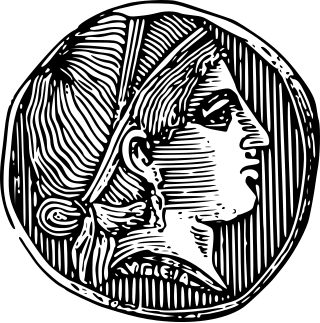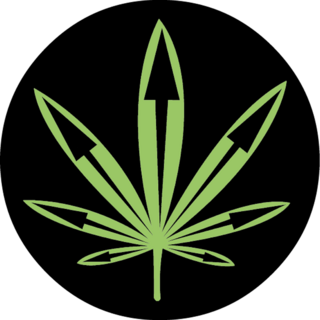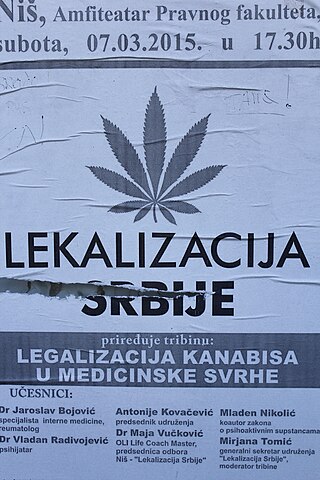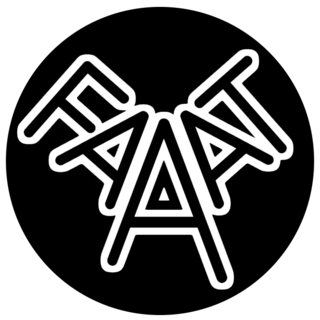
In the United States, the removal of cannabis from Schedule I of the Controlled Substances Act is a proposed legal and administrative change in cannabis-related law at the federal level. It has been proposed repeatedly since 1972. The category is the most tightly restricted category reserved for drugs that have "no currently accepted medical use.”

The Single Convention on Narcotic Drugs, 1961 is an international treaty that controls activities of specific narcotic drugs and lays down a system of regulations for their medical and scientific uses; it also establishes the International Narcotics Control Board.
The International Narcotics Control Board (INCB) is an independent treaty body, one of the four treaty-mandated bodies under international drug control law.

The Commission on Narcotic Drugs (CND) is one of the functional commissions of the United Nations' Economic and Social Council (ECOSOC), and is the central drug policy-making body within the United Nations System. The CND also has important mandates under the three international drug control conventions, alongside the three other treaty-mandated bodies: United Nations Office on Drugs and Crime, World Health Organization, and International Narcotics Control Board.
A drug policy is the policy regarding the control and regulation of psychoactive substances, particularly those that are addictive or cause physical and mental dependence. While drug policies are generally implemented by governments, entities at all levels may have specific policies related to drugs.

A Cannabis Social Club (CSC), sometimes called Cannabis Club, Cannabis Association, or Teapad, is an industry model for regulated cannabis organised as non-profit cooperatives in which cannabis is cultivated, shared, and enjoyed collectively, usually for the purpose of relaxing or for social communion.

The International Office of Public Hygiene, also known by its French name as the Office International d'Hygiène Publique and abbreviated as OIHP, was an international organization founded 9 December 1907 and based in Paris, France. It merged onto the World Health Organization after World War II.

The Convention on Psychotropic Substances of 1971 is a United Nations treaty designed to control psychoactive drugs such as amphetamine-type stimulants, barbiturates, benzodiazepines, and psychedelics signed in Vienna, Austria on 21 February 1971. The Single Convention on Narcotic Drugs of 1961 did not ban the many newly discovered psychotropics, since its scope was limited to drugs with cannabis, coca and opium-like effects.

Canada's drug regulations are measures of the Food and Drug Act and the Controlled Drugs and Substances Act. In relation to controlled and restricted drug products, the Controlled Drugs and Substances Act establishes eight schedules of drugs and new penalties for the possession, trafficking, exportation and production of controlled substances as defined by the Governor-in-Council. Drug policy of Canada has traditionally favoured punishment for the smallest of offences, but this convention was partially broken in 1996 with the passing of the Controlled Drugs and Substances Act.

The International Nonproprietary Name dronabinol, also known under the trade names Marinol, Syndros, Reduvo and Adversa, is a generic name for the molecule of delta-9-tetrahydrocannabinol in the pharmaceutical context. It has indications as an appetite stimulant, antiemetic, and sleep apnea reliever and is approved by the FDA as safe and effective for HIV/AIDS-induced anorexia and chemotherapy-induced nausea and vomiting only.

NORML France, previously known as Chanvre & Libertés - NORML France is a French non-profit organization based in Toulouse but active in all territories of France, whose aim is to move public opinion sufficiently to achieve the depenalization of illicit drugs consumption, the legalization of non-medical marijuana and the increased access to medical cannabis in France, so that the responsible use of cannabis by adults is no longer subject to penalty.

The status of cannabis in international law is a century-old history. Cannabis reform at the international level refers, in the 20th Century, to efforts to increase restrictions on cannabis use under international treaties; in the 21st Century, generally to efforts to ease or update such restrictions.

Camille Barrère was a French diplomat, most notably the ambassador to Italy from 1897 to 1924. In 1902, Barrère negotiated a secret accord with Italian Minister of Foreign Affairs Giulio Prinetti that ended both countries' historical rivalry for North Africa. The Prinetti-Barrère Accord stated that iin the event of a redistribution of Ottoman lands in Northern Africa, France would not contest an Italian claim on the lands of the Tripolitania Vilayet, which makes up modern Libya. In return, Italy would not contest a French claim on the Ottoman territory of Morocco. The agreement allowed for the French Agadir Crisis in Morocco in 1911 and the Italo-Turkish War of 1911-1912, which resulted in the taking of both territories. Barrère also was a key figure in arranging the 1915 secret Treaty of London between Italy and the Triple Entente, which resulted in Italy abandoning its Triple Alliance partners of Germany and Austro-Hungary during the First World War.

For Alternative Approaches to Addiction, Think & do tank is an international non-profit organization working on drug policy, created in 2015 and based in Paris, France.

Michael Alan Krawitz is a US Air force veteran, Executive Director of the non-profit Veterans for Medical Cannabis Access, researcher on the history of medical cannabis, and international advocate for cannabis policy reform with FAAAT think & do tank and the International Association for Cannabinoid Medicines.
This is a social history of the 2020s. Social history refers to changes affecting societies and the lived experiences of their members.
The removal of cannabis and cannabis resin from Schedule IV of the Single Convention on narcotic drugs, 1961 is a change in international law that took place in 2021, on the basis of a scientific assessment by the World Health Organization.

The Horizontal Working Party on Drugs is a preparatory body of the Council of the European Union established in 1997, responsible for the lead and management of the work of the council and of the European Union (EU) on drug policy.
Cannabis Sans Frontières is a cannabis law reform organization founded and led by Farid Ghehiouèche and Michel Sitbon.












